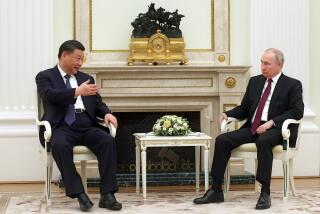China Supports U.S.-Soviet Talks on Regional Wars
- Share via
WASHINGTON — China supports President Reagan’s proposal for U.S.-Soviet negotiations to end regional conflicts in five Third World countries and would welcome annual summits between the two superpowers, Chinese Ambassador Han Xu declared Wednesday.
Han said that the Reagan plan, which calls for U.S.-Soviet negotiations to help end hostilities in Afghanistan, Angola, Cambodia, Ethiopia and Nicaragua, could be “conducive to world peace.”
However, asked about China’s concern in the past that the two superpowers might make deals between themselves with little regard for third countries, Han said that China supports U.S.-Soviet negotiations “as long as there is no harm to a third party.”
Reagan, who disclosed his proposal for resolving the regional conflicts during a speech at the United Nations last week, said it will be a “central issue” for discussion when he meets with Soviet leader Mikhail S. Gorbachev at the Nov. 19-20 summit in Geneva.
U.S. Backing Rebels
The Soviets are supporting Marxist-Leninist regimes against guerrilla movements in all five of the nations. The United States openly supports rebels trying to overthrow the governments of Afghanistan and Nicaragua, and it has supplied covert aid to Cambodians fighting Soviet-supported Vietnamese soldiers who have overrun their nation.
Han, interviewed at a breakfast session with The Times’ Washington Bureau, said that China sees the Reagan-Gorbachev summit as an opportunity to relax tensions and supports a suggestion made by former President Richard M. Nixon for annual summits between the two superpowers.
The Geneva summit will be Reagan’s first session with a Soviet counterpart in the President’s almost five years in office and he has given no official indication that he would favor annual summits. However, a senior Administration official, speaking on condition he not be identified, suggested that Reagan’s most tangible achievement at Geneva might be an agreement for regular meetings between U.S. and Soviet leaders.
“Suppose there was an agreement for periodic summits,” the official said. “It would be seen as a step in the right direction and a win for a President with such a conservative record.”
3 Sino-Soviet Issues
Han, a veteran diplomat who served as a counselor at the Chinese Embassy in Moscow in 1964-65, said three major security issues still aggravate Sino-Soviet relations: the Soviet military presence in Afghanistan, Soviet support for Vietnamese troops in Cambodia and the deployment of Soviet armies along the Sino-Soviet and Sino-Mongolian borders.
He indicated that there has been no progress in resolving any of these issues. Some Reagan Administration officials have suggested that the six-year-old Afghanistan war has proved so costly for Moscow that it may be looking for a way to withdraw its forces without losing face. But Han said he sees no indication that the Soviets will pull out in the near future.
“I think it’s a heavy burden on them like Vietnam was on your shoulders during that time (of war),” he said. “So let them take the burden.”
Han, who has been ambassador since May, emphatically denied recent charges by Sen. Alan Cranston (D-Calif.) that China has exported nuclear technology to Iran, Argentina, Pakistan, Brazil and South Africa in violation of Peking’s pledge not to help other countries develop atomic weapons.
‘No Deals at All’
China has struck “no deals at all” to supply such technology to any of the countries and is committed to supporting non-proliferation of nuclear weapons, said Han, who previously served here as deputy chief of the Liaison Office from 1973 until full diplomatic relations were established in 1979.
Asked specifically about Cranston’s charges that China had supplied nuclear technology to Iran, helped Pakistan develop nuclear weapons and sold low-grade enriched uranium to South Africa, Han declared:
“We have never sold any low grade of nuclear material to South Africa, nor do we have any deal with Iran and not with Pakistan. We have (only) peaceful use of nuclear energy.”
More to Read
Sign up for Essential California
The most important California stories and recommendations in your inbox every morning.
You may occasionally receive promotional content from the Los Angeles Times.












